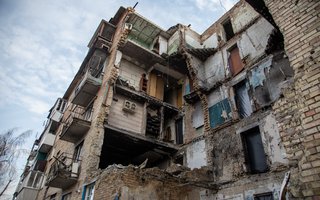Local peacebuilders call for more informed solidarity with Ukraine
In this article, peacebuilders from Ukraine ask for more informed solidarity from the international community, and explain the reasoning for their recent appeal, which includes a call for continued weapons supply.

We are Ukraine’s Community of Dialogue Practitioners. Together with our friends and colleagues from the Ukrainian Feminist Network for Freedom and Democracy, we have initiated the Ukraine Peace Appeal: Towards a more informed solidarity. This appeal was actively supported by Ukrainian civil society and signed by more than 130 NGOs and individuals. With it, we try to address international peacebuilding professionals and peace activists.
Those who have signed our Appeal want peace in Ukraine more than anything else. Yet, we call for the continuation of weapons deliveries. It might sound like a contradiction to outsiders, but not to us.
Let us try to explain:
More and more voices, across the political spectrum, are arguing for an end to the provision of military support to Ukraine. They also call for an immediate cease-fire between Ukraine and Russia as part of the strategy for “ending the war”. Although there is recognition that a ceasefire alone is not enough to resolve the conflict, this is not the way forward. These calls for “peace by peaceful means” and negotiations without resistance are, in reality, calls for Ukraine to surrender our sovereignty and territorial integrity.
We demand nothing less than full compliance with international humanitarian law, human rights, and the UN Charter. We also need the practical means to protect the lives of our people, our sovereignty and territorial integrity, and to resist the Kremlin’s attempts to re-colonise its neighbours.
We do appreciate the efforts to mediate and support negotiations for the withdrawal of Russian troops, the exchange of prisoners of war, the return of deported Ukrainian children, the elimination of the nuclear threat, and the free transportation of grain. We are grateful to the international community for standing by our side and sharing with us this high price of peace.
However, we ask the international community for further understanding and a more informed approach to solidarity.
The international community needs to respect the right of Ukrainians to play a major role in determining how to achieve peace and protect themselves, based on the principle of “nothing about us without us”. The Ukrainian military is not fighting as proxy for the West, as some suggest. We choose to live in a world where human lives matter, where democracy matters, where international law matters.
As we stress in the Appeal: “Yes, we need diplomacy, and yes, we need humanitarian aid, but make no mistake, Ukraine needs to continue to be supported with modern weaponry and other military assistance and strict economic and political sanctions on the Kremlin.” Otherwise, Russia’s aggression cannot be stopped.
Amid the conditions where the lives of millions of Ukrainians are threatened, no discussions about “restoring peace by peaceful means” make any practical sense. This will not stop Putin. Instead, it threatens to legitimise similar expansionist violence and brute force from countries with nuclear weapons, and thus could set a precedent for other states with authoritarian regimes to follow. The international community cannot let nuclear arms become a guarantee of security and impunity for those who break international law.

Ukraine Peace Appeal: Towards a more informed solidarity
Reconciling an appeal for arms as peacebuilders
We are not warmongers. The Ukrainian Community of Dialogue Practitioners (CoDP) is a network of more than 30 individuals, national associations, and NGOs working (some for more than 20 years) in the field of dialogue, mediation, conflict resolution and peacebuilding in Ukraine and other countries. The CoDP is based on the common principles of local ownership, inclusiveness, trauma- and conflict sensitivity, and is rooted in previous dialogues in Ukraine, including after the beginning of the war in 2014.
Was it difficult for us to reconcile peacebuilding and dialogue ethics with a request for weapons provision? No. It has been surprisingly easy for our network to decide to intervene, to initiate and to formulate the Appeal. We make important decisions based on a consensus, and the draft text was approved by all the members with minimal amendments in a matter of several days. Internal clarity and confidence are some of the unexpected effects of the war that many of us have experienced and observed since the beginning of the full-scale invasion. It is quite empowering.
This Appeal has united Ukrainian civil society organisations from across different areas of work. For the first time ever mediators, feminists and human rights defenders have spoken in one voice. We have experienced local solidarity like never before, and strive to make the next step – asking for a more informed international solidarity. This Appeal asks partners to walk the talk of decolonisation and a localised peacebuilding approach to international conflict resolution: emphasising mutual recognition and respect, genuine understanding of the complexities of the context, and amplifying connections and networks across communities and borders.
We have also seen a positive response from some international organisations – an openness to this call for informed solidarity, and a softening, nuancing of some pacifist rhetoric. Peacebuilding approaches need to be rethought, and we hope to work together with our international friends and colleagues on (re)building the better world we all want to see for our and their children.







